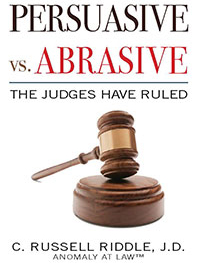Context is crucial, not only in communication but life itself.
Ani DiFranco has said, “Taken out of context I must seem so strange.” Without opining in any way about Ms. DiFranco personally, she makes a valid point.
This came to mind the other night as I searched every nook and cranny of our bedroom for a tenacious cricket that was driving me mad in the wee hours of my would-be slumber. He had declared a war he would not win! I flicked on the light and toppled furniture as I waxed profane eloquence. Would I rip off his hind legs one at a time or just snuff his life out with one swift stomp? (He succumbed to the latter fate.)
My wife glared and muttered through clenched teeth, “Are you quite done? Little Jiminy wasn’t nearly as annoying as YOU!”
I responded with a safe, neutral-toned, “Good night, Darling.”
As I lay me down to sleep, beaming from having conquered the beast, I couldn’t help but wonder, “Why is a cricket’s chirping so relaxing to me when I’m camping, yet reduces me to a lunatic at home?” Answer: context! A cricket is integral to the woods . . . first violin . . . a virtuoso in nature’s nocturnal orchestra. But the smelly little fiddler has no place in man’s castle!
It is not unlike a congratulatory slap on the rump. In the setting of a football game, roughly tapping on another’s bottom means affirmation; in a corporate meeting it means litigation. You see, context is of utmost importance. One simply doesn’t pour a huge cooler of Gatorade on the CEO’s head in the closing moments of a board meeting.
One also does not “exploit” children, the elderly, indeed, ANY other human being unless one is crude and despicable. But one who excels in “exploiting” the company’s intellectual property assets is shrewd and promoted.
Think about it . . . a “poo poo platter” whets the appetite . . . but only in the context of a Chinese restaurant!
Similarly, some decorate a dead tree and gather ’round it to sing and munch on candy they found in an old sock . . . done any time other than late December, find yourself flying over the cuckoo’s nest.
And dare try to perform the Heimlich maneuver on some attractive stranger who’s NOT choking! (This will not make a good first impression.)
Those exquisite one-piece bikinis common on European beaches – noticeably absent from small-town USA community pools (thank goodness in many instances!).
Speaking of cultural context, Englishmen may speak English, but they hear the language quite differently than Americans do at times. Things got quite interesting when a former employer of mine was acquired by its British competitor. For instance, I still maintain that the earth awkwardly stopped turning for a moment during a joint-management meeting. One of the Texans had thought he was being ultra-polite by adapting a common phrase to “losing our FANNY” (on a given transaction). To the contrary, the Red Coats reacted with facial expressions conjuring a constipated Benny Hill. (It turns out that in London-speak “fanny” is not interchangeable with “bum,” but is crass slang for another anatomic region.)
A female colleague in the company shared a similar awkward moment. Upon checking into a European hotel, she was asked, “Would you like us to knock you up in the morning?” She recalled thinking, “Gee, this IS a ‘full-service’ hotel!” (Such was Euro for “Would you like a wakeup call?”) Context!
I think back to a plaintiff lawyer’s opening statement early in my legal career. His client had sued a television station for libel. Quite full of himself, the attorney theatrically recited Shakespeare:
“Good name in man and woman, dear my lord,
Is the immediate jewel of their souls:
Who steals my purse steals trash; ’tis something, nothing;
’Twas mine, ’tis his, and has been slave to thousands;
But he that filches from me my good name
Robs me of that which not enriches him
And makes me poor indeed.” (Othello, Act 3, Scene 3)
Our firm was defending the station, and my mentor looked like the cat that swallowed the canary as he rose, buttoned his suit coat and countered: “Plaintiff’s counsel adeptly quotes Iago, a key character in the classic work Othello. However, what counsel hasn’t told you is that Iago plays the villain, who, having been passed over for promotion in Othello’s regime, casts a tangled web of deceit. Iago seeks revenge, friends and associates be damned. Such an immoral and manipulative sort has hardly a ‘name’ worth filching.”
Twelve angry men and women glared at lawyer number one. I think the verdict was already decided (we won). Ani DiFranco would have been proud.
© 2012 Russ Riddle. All rights reserved.

